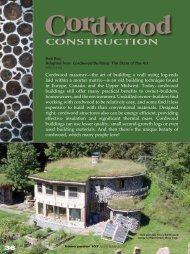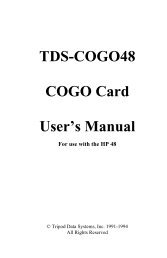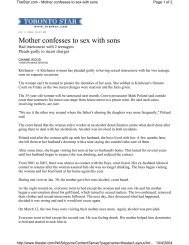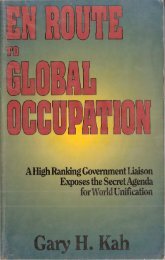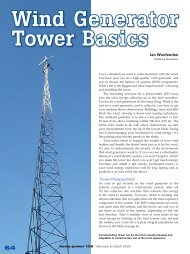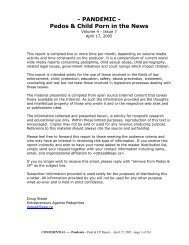G. Edward Griffin - The Fearful Master - PDF Archive
G. Edward Griffin - The Fearful Master - PDF Archive
G. Edward Griffin - The Fearful Master - PDF Archive
You also want an ePaper? Increase the reach of your titles
YUMPU automatically turns print PDFs into web optimized ePapers that Google loves.
after dismissal. One of the factors cited by the tribunal as justification for this award was<br />
"the fact that he joined the UN at the special request of Mr. Ralph Bunche." 37<br />
In spite of all this Dwight D. Eisenhower, while president of Columbia University, praised<br />
Ralph Bunche as "the greatest statesman this country has produced." 38 <strong>The</strong> Eisenhower<br />
appointed loyalty review board, likewise, found no reason to question the loyalty of Ralph<br />
Bunche. He was routinely cleared along with a host of others with similar backgrounds.<br />
On May 31, 1954, just three days after Bunche received his security clearance, the<br />
Communist Daily Worker ran an article which boasted:<br />
<strong>The</strong> UN was getting ready to appoint Dr. Ralph J. Bunche to a new high<br />
post when certain racist "anti-Communist" forces moved to stop this. . . .<br />
And so Dr. Bunche again had to solemnly prove his "loyalty"-- meaning<br />
that be had to prove be is innocent of the "crime" of Marxism and is a<br />
reliable supporter of the "anti-Communist" policy. <strong>The</strong> plans of the "anti-<br />
Communists" who could not stomach the idea of a Negro in a top UN<br />
post couldn't be carried through. <strong>The</strong> same enormous anti-racist<br />
pressure which, in the U.S.A. and throughout the world, compelled the<br />
Supreme Court to declare segregated schools and housing un-<br />
Constitutional, also blocked this scheme. But what was revealed again<br />
was the un-American machinery of the "anti-Communist" frame-up mill.<br />
Bunche, thanks to the new anti-racist upsurge, escaped. 39<br />
Philip Jessup: Philip Jessup is the man who represents the United States as one of the<br />
eleven justices on the United Nations World Court. His past is studded with affiliations with<br />
groups officially designated as Communist fronts. One of these, the Institute of Pacific<br />
Relations, has already been discussed. However, since Jessup was probably the most<br />
prominent and influential of all the leaders of this organization, it warrants recalling that the<br />
Senate Internal Security Subcommittee found that:<br />
<strong>The</strong> IPR has been considered by the American Communists and by<br />
Soviet officials as an instrument of Communist policy, propaganda and<br />
military intelligence. . . . A small core of officials and staff members<br />
carried the main burden of IPR activities and directed its administration<br />
and policies. Members of the small core of officials and staff members<br />
who controlled the IPR were either Communists or pro-Communists.<br />
Jessup was chairman of the IPR American council from 1939 to 1940 and chairman of its<br />
Pacific council from 1939 to 1942. Both councils were high-level policy-making bodies. 40<br />
Jessup, both in and out of the IPR, was closely associated with Alger Hiss, Harry Dexter<br />
White, Frederick Vanderbilt Field and Lauchlin Currie. And, like Ralph Bunche, he came to<br />
the defense of Hiss as a character witness at Hiss's trial.<br />
When Frank Coe, secretary of the United Nations International Monetary Fund, testified<br />
before the Senate Internal Security Subcommittee in 1952, be inadvertently put Jessup in<br />
rather strange company. After readily answering questions about his associations with<br />
sundry individuals who had never been implicated in the Communist conspiracy, he<br />
suddenly found it necessary to invoke the Fifth Amendment when asked if he knew Philip<br />
Jessup.


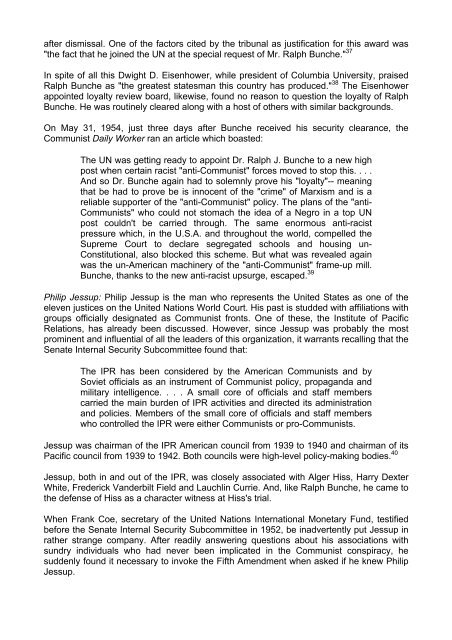
![Robert T McQuaid [rtmq@stn.net] Sent: Friday, October 29, 2004 12 ...](https://img.yumpu.com/51070071/1/190x245/robert-t-mcquaid-rtmqstnnet-sent-friday-october-29-2004-12-.jpg?quality=85)
